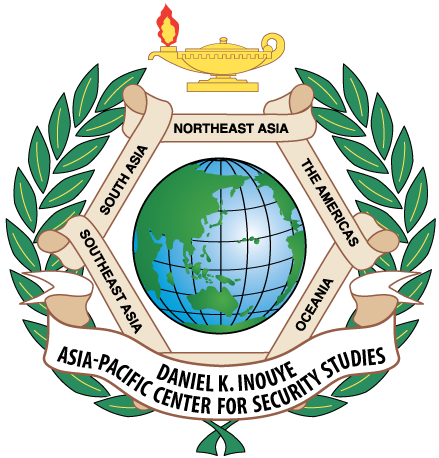Home - Daniel K. Inouye Asia-Pacific Center for Security Studies (original) (raw)
HomeAPCSS Editor2024-11-08T16:39:17-10:00

Educate • Connect • Empower
Daniel K. Inouye Asia-Pacific Center for Security Studies is an institution that provides a forum where military and civilian leaders from the Indo-Pacific gather to address regional and global security.
Programs & Links.
Security Nexus
DKI APCSS
Online Journal
A free, open access, international, peer-reviewed, online publication for DKI APCSS faculty and alumni.
Dialogue convenes top experts to explore the Indo-Pacific’s security challenges, offering insights and solutions.
College of Security Studies
Publication
DKI APCSS Books, Articles, Currents Magazine
Published Edited Volumes and Post
Admission
The initial point of contact for representatives who are selected to attend DKI APCSS courses.
Alumni
The Alumni Program provides a forum for former graduates and faculty to maintain contact with the Center and with each other.
Workshop
Multilateral forums of subject matter experts who will produce actionable outcomes to meet the very focused objectives of the specific regional security topic.
Calendar
Upcoming DKI APCSS Events and Courses.
WPS
DKI APCSS and Women, Peace, and Security
DKI APCSSS gender inclusive strategies in response to evolving national and transnational threats.
Volunteer Programs
Internship | Visiting Scholar | Visiting Practitioner
We nurture future public service leaders through hands-on experience, skill development, and government engagement.
Contact
College of Security Studies
Calendar
APCSS Link
Latest News
APCSS Editor2024-12-21T10:14:12-10:00
New article on Non-State Actors and Irregular Warfare by Sam Mullins
APCSS Editor2024-12-21T10:14:12-10:00December 21st, 2024|0 Comments
In "The Role of Non-State Actors as Proxies in Irregular Warfare and Malign State Influence," Dr. Sam Mullins examines how states like China and Russia leverage non-state actors (NSAs) to conduct irregular warfare, employing tactics that blur the lines between peace and conflict. These NSAs engage in activities ranging from persistent low-level operations aimed at undermining adversaries' institutions to more aggressive actions that challenge the sovereignty of other nations.
APCSS Editor2024-12-21T07:59:25-10:00
Dialogues: Conversations Shaping Security Webinar Series
Don’t miss the upcoming Conversations Shaping Security dialogues, where thought leaders and experts tackle critical issues impacting the Indo-Pacific and global security landscape. This webinar series provides insights into the geopolitical, economic, and humanitarian challenges shaping our world, offering a chance to engage in timely discussions that matter. Dialogue #36: Korea’s Martial Law Fallout, Jan 13, 2025 03:00 PM in Hawaii Dialogue #35: Indo-Pacific Humanity and Geopolitics, Jan 27, 2025 03:00 PM in Hawaii
APCSS Editor2024-12-18T13:10:02-10:00
TSC bring senior leaders together to explore opportunities for cooperation
The Transnational Security Cooperation course is an in-depth executive education program designed to prepare senior security practitioners and military leaders to engage in cooperative security efforts that advance a free and open Indo-Pacific. Recently 38 senior leaders from 25 countries and three regional organizations participated in the TSC24-2 course hosted by the Daniel K. Inouye Asia-Pacific Center for Security Studies from December 8-13, 2024, in Honolulu. “Aided by a challenging curriculum, TSC 24-2 participants seized the opportunity to frankly discuss some of the most pressing strategic issues in the Indo-Pacific,” said course manager Dr. Al Oehlers. “Vitally, by exchanging invaluable insights and creatively crafting collaborative approaches to shared priorities, bonds of understanding and friendship were fostered that will last for years to come.”
APCSS Editor2024-12-10T14:37:14-10:00
Lauren Dickey and DKI APCSS’ Col. Matthew Kent Call for a Reassessment of U.S. Policy on Taiwan in War on the Rocks
“This is Not the Status Quo You’re Looking For” by Lauren Dickey and DKI APCSS’ Col. Matthew Kent was recently published by War on the Rocks. In the article, the authors argue that the United States’ longstanding policy of maintaining the “status quo” on Taiwan is increasingly misaligned with contemporary geostrategic realities. Rooted in Cold War-era agreements, the policy aims to deter hostilities by avoiding an official stance on Taiwan’s sovereignty. However, this approach has not accounted for China’s use of gray zone tactics—subtle, coercive measures that fall short of provoking military conflict but aim to achieve political objectives. According to the authors, the “status quo,” once effective in a very different geopolitical landscape, now risks enabling China’s aggressive posturing and undermining Taiwan’s security.



